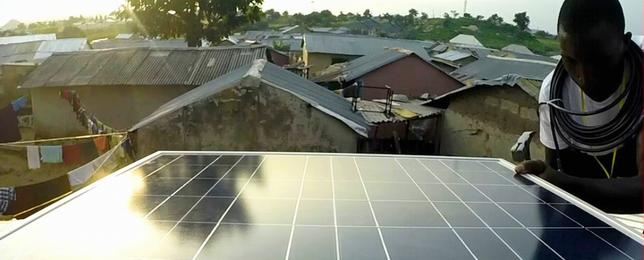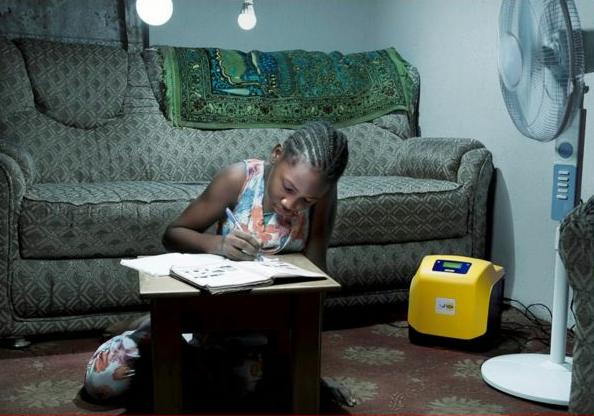Solar-Powered Lights Flick On Across Nigeria
By Sunny Lewis
WASHINGTON, DC, November 4, 2015 (Maximpact News) – The U.S. government’s development finance institution, the Overseas Private Investment Corporation (OPIC), has signed a US$15 million commitment to finance a business that provides solar electricity to homes and small business throughout Nigeria.
The off-grid electricity provider is Txtlight Power Solutions, Ltd. doing business as Nova-Lumos, and the signing took place on October 21 as part of Secretary of State John Kerry’s Climate and Clean Energy Investment Forum.
“Lumos brings vision, innovation, and sound business sense to address the power access challenge in Africa,” said Elizabeth Littlefield, OPIC’s president and chief executive.
“With a dedication to those who live off-grid or have unreliable power access,” she said, “Lumos’ creative business model will positively impact millions with new affordable electricity access in homes, businesses, medical facilities, and schools.”
This is the largest OPIC investment in Africa’s off-grid power sector, a key component of increasing energy access in a region where people are not grid-connected and the need for reliable power is especially acute.
Based in Amsterdam, the Netherlands, Nova-Lumos is the world’s first distributed utility provider, bringing affordable, modern and clean electricity to communities that have been living off the grid.
With this OPIC financing, Lumos will be able to increase power access to the nearly 90 million Nigerians who currently live without any connection to the electric grid.
Lumos connects the mobile payment revolution and solar energy. Through partnerships with mobile operators, Lumos provides electricity on a lease to own basis, purchased by mobile phone.
Lumos customers replace kerosene and candles with solar-powered electricity that can allows them to turn on lights, cellphones, fans, computers and TVs – all at once.
Lumos offers a patented, self-deployable mobile energy system, with integrated cellular payment and advanced security mechanisms. The service includes a home solar panel linked to an indoor storage and connection unit.
And it’s affordable. Lumos customers utilize a “pay-as-you-go” model, buying power in small amounts, by text message.
One the corporate level, it’s the $15 million in funding from OPIC that makes it possible for Lumos customers to make small, affordable payments.
David Vortman, Lumos chief executive and co-founder, said, “We are very excited about this major financing milestone in partnership with OPIC, which will enable us to accelerate our growth in Nigeria and improve the lives of millions.”
“Having the backing of an institution such as OPIC provides a vote of confidence in Lumos’ innovative core technology and our unique business model that drives most of our value as a company,” Vortman said.
Lumos’ business model is scalable in large part due to the company’s partnerships with mobile communications operators.
In Nigeria, Lumos has partnered with MTN, Nigeria largest telecommunications company with a subscriber base of over 60 million people.
Lumos was also a recipient of early-stage catalytic funding through OPIC and the Africa Clean Energy Finance initiative. This partnership with the U.S. State Department provided start-up capital for 30 innovative clean energy projects across 10 African countries.
Lumos recently became an official private sector partner of President Barack Obama’s Power Africa initiative, a partnership among more than 100 public and private sector partners to bring new power access to the more than 600 million Sub-Saharan Africans that currently live without electricity.
As a key part of Power Africa, OPIC financing allows private companies like Lumos to scale up business models and broadly increase new power access across Africa.
Vortman and other Lumos executives believe the Nigerian project is just the beginning of the company’s relationship with OPIC as it grows in Nigeria and elsewhere across the developing world.
OPIC declares that all its projects “adhere to high environmental and social standards and respect human rights, including worker’s rights.”
By mandating high standards, OPIC says it helps to raise the industry and regional standards of the more than 160 countries in which its projects operate.
A young girl in Nigeria is able to do her homework after dark with the help of a solar light powered by Lumos, an OPIC partner that provides off-grid solar solutions to remote communities.
(Photo courtesy OPIC)
Featured image: Nigerian man installs a Lumos solar system. Customers will pay by cellphone as they consume the power. (Photo courtesy Nova-Lumos)
Award-winning journalist Sunny Lewis is founding editor in chief of the Environment News Service (ENS), the original daily wire service of the environment, publishing since 1990.

